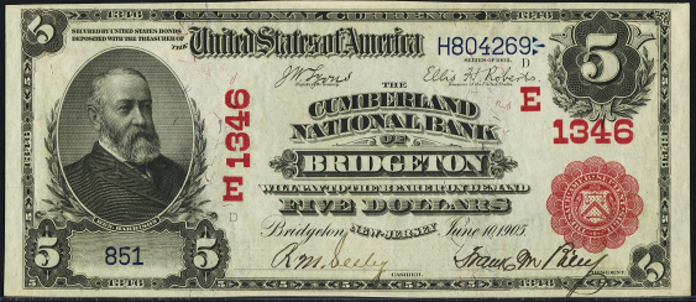Five Dollar Notes › Nationals › 1902 Five Dollar National Bank Notes › New Hampshire Charters › 1902 $5 Claremont New Hampshire Claremont National Bank
Get Value Now
| Item | Info |
|---|---|
| Series | 1902 |
| Charter | #596 Claremont National Bank of Claremont, New Hampshire |
| Year Chartered | 1864, 503 Banks Chartered |
| City Info | Claremont is a city in Sullivan County, New Hampshire, United States. The population was 13,355 at the 2010 census. Before colonial settlement, the Upper Connecticut River Valley was home to the Pennacook and Western Abenaki peoples, later merging with members of other Algonquin tribes displaced by the wars and famines that accompanied the European settling of the region. The Hunter Archeological Site, located near the bridge connecting Claremont with Ascutney, Vermont, is a significant prehistoric Native American site that includes seven levels of occupational evidence, including evidence of at least three longhouses. The oldest dates recorded from evidence gathered during excavations in 1967 were to AD 1300. Source: Wikipedia |
| Similar Cities | If your note doesn't match try: 1. Claremont, New Hampshire - Peoples National Bank 2. Claremont, California - First National Bank 3. Claremont, California - Claremont National Bank 4. Claremont, California - Citizens' National Bank |
| Seal Varieties | Red, Blue |
| See Also | If your note doesn't match try: 1. 1907 $5 Legal Tender 2. 1899 $5 Silver Certificates |
| Other Info | 1. Value depends on notes known for charter, condition and market demand. |
| Neat Fact | 1-5 Digit Charter number critical to note identification. It is Red, Blue, Black or rarely absent altogehter. It is printed over the note design. |
No Obligations Offers and Appraisals
Please submit a good photo or scan. It will be identified and evaluated. Understand there may be subtle differences between the image you see above and your note. Signatures, design, markings and note condition will determine the offer price. Notes in Uncirculated or better condition receive the best offers.
Appraisals can be estimated for wholesale and retail prices. Wholesale is what dealers typically pay. Retail is what a collector might pay. Retail is slightly higher in most cases.
Please visit this page for USA Paper Money Reference. Do not treat this page as a reference guide, it is for appraisal and acquisition purposes only.
